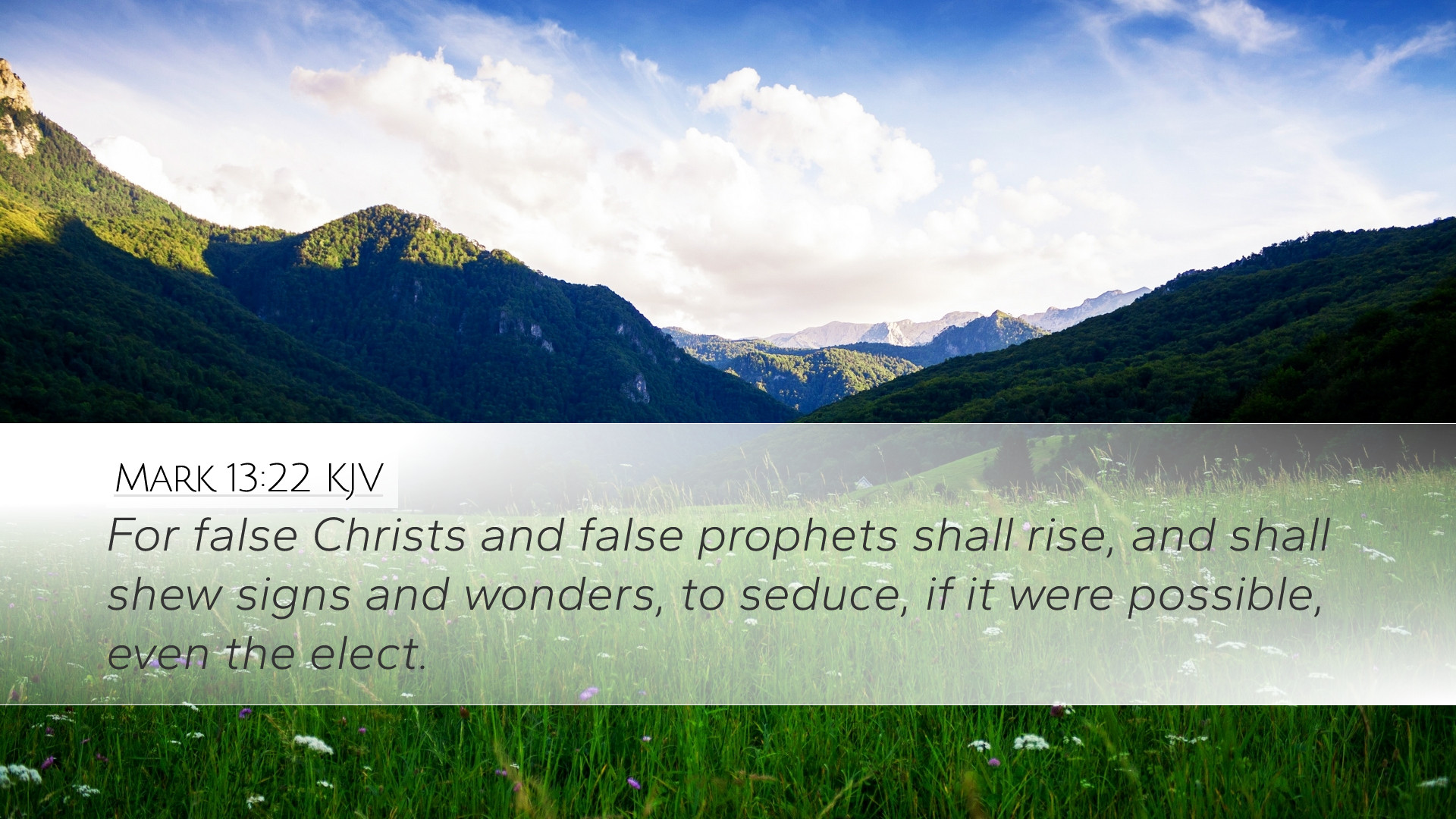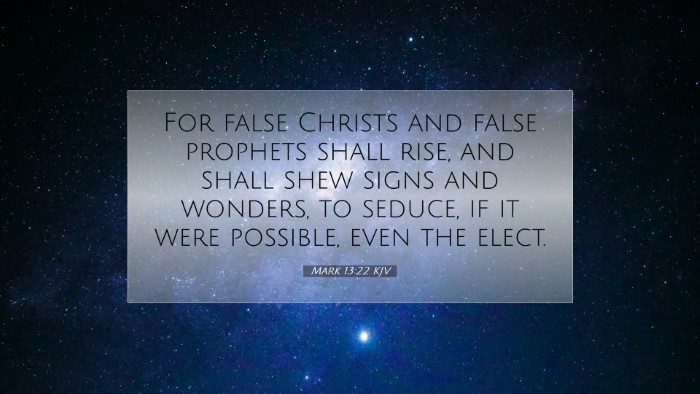Commentary on Mark 13:22
Verse: "For false Christs and false prophets will arise and show signs and wonders to deceive, if possible, even the elect." (Mark 13:22)
Introduction
In this eschatological discourse, Jesus warns of the deceptive nature of false prophets and false Christs. This passage, situated within the Olivet Discourse, highlights the urgency of discernment among believers as they navigate a world filled with spiritual deception.
Contextual Analysis
The context of Mark 13 is essential to understanding the depth of Jesus’ warning. He speaks to His disciples about the destruction of the Temple and the signs of the end times. The broader context frames this verse as a caution against complacency and encourages vigilance in faith.
Historical Context
Historically, the Jewish people often anticipated a Messiah who would liberate them from oppression. As the early church developed, it faced various false teachers who claimed to offer salvation or deliverance contrary to the Gospel.
Theological Implications
This verse brings to light the nature of spiritual warfare and the reality of counterfeits in the faith community. Just as genuine discipleship requires adherence to Christ, so too does it invite the risk of being misled by those who misuse spiritual authority.
Commentary Insights
Matthew Henry's Perspective
Matthew Henry emphasizes that the presence of false Christs and prophets is a sign of the last days. He interprets this as an essential warning for believers to remain alert and steadfast in their faith, underscoring that their ability to discern is strengthened by a deep understanding of Scripture.
Henry states that these false prophets may possess an appearance of legitimacy, performing signs and wonders to draw away even the elect. He emphasizes the need for constant vigilance, suggesting that true believers must rely on the guidance of the Holy Spirit and the Word of God to discern truth from deception.
Albert Barnes' Insights
Albert Barnes approaches this verse by highlighting the implications of false prophets who, armed with signs, can lead even the most devoted astray. He posits that the effectiveness of such deception lies in its subtlety. Barnes argues that miraculous signs are not inherently indicative of divine authority. He reinforces the necessity for believers to test every spirit against the authenticity of the Gospel.
He further explains that the elect—the chosen ones—are not impervious to such deception, but rather must be vigilant and discerning. This acknowledgment of the possibility of deception among the elect serves to strengthen their resolve to seek truth earnestly.
Adam Clarke's Commentary
Adam Clarke notes that the rise of false prophets is part of the divine foreknowledge of God. He suggests that these individuals will emerge from within the community of believers, making their deceit even more dangerous, as they will seem to speak with authority. Clarke argues that the ultimate purpose of these signs and wonders will be to undermine faith in Christ and distract from the true Gospel message.
Clarke also highlights the exhortation for believers to stay grounded in Scripture and to embrace their identity in Christ, which serves as a safeguard against deception.
Practical Application
This verse is exceptionally pertinent for modern-day believers and leaders. As the body of Christ, the church must remain vigilant against teachings and practices that diverge from biblical truth. Here are some practical applications:
- Discernment: Foster a culture of discernment within congregations, where members are encouraged to critically examine teachings against Scripture.
- Education: Prioritize biblical literacy and theology in church programs to equip believers with the knowledge necessary to identify false teachings.
- Community: Create small group discussions that facilitate open conversations about spiritual experiences and interpretations, fostering accountability and growth.
- Prayer: Encourage prayers for wisdom and discernment as a vital part of the believer's life, asking the Holy Spirit for guidance in all spiritual matters.
Conclusion
Mark 13:22 serves as a poignant reminder of the necessity for vigilance in the faith. The insights gleaned from commentators such as Matthew Henry, Albert Barnes, and Adam Clarke emphasize the important call to discernment, rooted in a thorough understanding of Scripture and the empowerment of the Holy Spirit. As believers, we must remain anchored in the truth to navigate the challenges and deceptions of our time.


